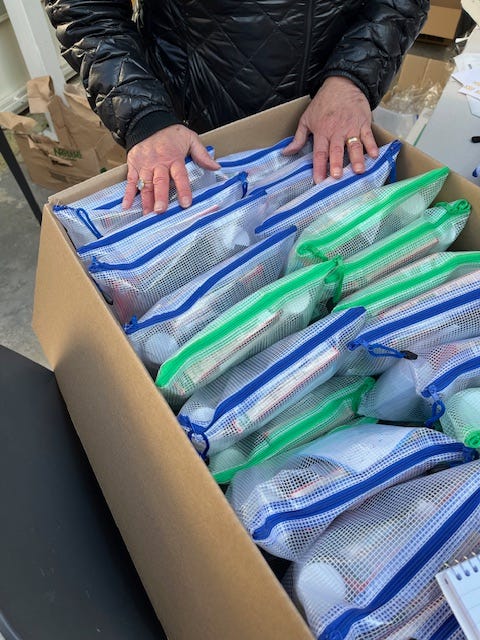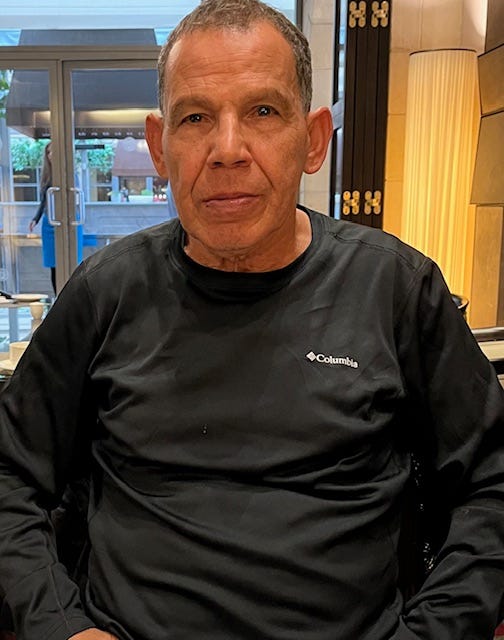Israel's Other Volunteer Army
How one nameless, low-key project embodies a society’s love for its soldiers.
Love balm: More than 55,000 toiletry kits have been assembled and distributed to IDF soldiers since mid-October.
Dear Reader,
Jerusalem – On the cusp of marking 100 days since October 7, the mood in Israel has shifted from the initial deep shock and rage to at least an outward return to the routines of daily life – but tinged with the constant, grim reality of the heavy toll the war is taking on the hearts, minds and souls of its citizens.
A painful national ritual is seeing the faces of young, fallen soldiers, smiling and filled with promise, leading the news almost every day, and reading about how they died and where their funerals are being held.
Yet with it all, the spirit and resilience of Israeli society remains high, and deeply inspiring. Citizens’ countless voluntary acts of kindness – large and small – take place every day on behalf of the soldiers, their families, and the tens of thousands of citizens of the north and south who are refugees in their own country.
There are major “chamals” (strategic volunteer operations) in Tel Aviv and Jerusalem that have thousands of volunteers dealing with every imaginable form of social service, and there are hundreds of groups, formal and informal, making and delivering food, providing clothing, offering counseling, etc.
Following is just one example of a nameless, low-key but impactful project that has lifted the spirits of its volunteers as much as the soldiers who benefit from it:
Chana Hidegkuti made aliyah from America four years ago after a career as a compliance officer for a number of banks. She spends most of her free time these days in a small outdoor space just off busy Emek Refaim in the heart of the German Colony, helping to put together small kits of toiletry items that are sent to IDF soldiers on the front lines in Gaza or the north.
A vivacious woman with a warm smile, she loves the fact that all volunteers are equal. “You can be the chief of oncology at a big hospital in America,” she says, “but here you’re, say, the chief of bath gel.”
All equals: Chana Hidegkuti is a regular fixture at the Germany Colony packing site.s
Along with the bath gel, the kits include talc for soldiers to put in their boots, toothpaste, toothbrush, a small box of Cheerios, a tube of anti-chafing cream for skin irritation, a packet of eye solution, Q-tips, toothpicks and several packets of hand wipes.
Spend an hour or so at this small beehive of activity, amidst make-shift surroundings of piled up boxes, and talk to the volunteers and you come to understand why they’re here and why they find their menial tasks so fulfilling.
Chana says she thinks “of the soldiers, they’re cold and away from home” and making heroic sacrifices for the country, noting that such thoughts often have her in tears.
“It gives me something to do to take my mind off my worries,” said one woman with close relatives in the army. “This is a country,” she says, “that doesn’t sleep at night.” Another woman said that volunteering regularly gives her a sense of community and purpose. “I look forward to it when I’m sitting at home.”
Chaim Leibtag, who recently made aliyah from the U.S., said he volunteers simply because “it’s a war, and this is what we’re supposed to do.”
Sophie Berman, a friendly woman with an easy manner, is in charge of the operation, which began in mid-October and is active most weekdays, weather permitting. She and her brother had a food truck and sold crepes, she told me, but after he was called up in the reserves, she began devoting most of her time to recruiting volunteers and supervising their efforts at the German Colony packing site.
She said about 20 to 40 volunteers are on hand each working day, most of them retirees. Many are English-speakers and are either olim or, like my wife, Judy, and me, visitors from America or other countries who just want to be in Israel now.
What impresses Sophie most is the sense of commitment of the regulars. “I make coffee and serve cookies every day,” she told me, “but nobody touches them.” Maybe she makes lousy coffee, I suggested with a smile. “No, they just want to be here and do this work. They don’t even take breaks. It’s amazing.”
After about a month as a volunteer, Sophie was hired by Moshe Hava, the local businessman who conceived of, finances and hosts – behind his office building – what he calls “the kits” project.
Looking out for the soldiers: Moshe Hava, remembering his discomfort as a soldier more than five decades ago, is taking care of today’s army.
He explained to me in an interview that when he was a soldier during Israel’s war of attrition with Egypt, in 1968 and ‘69, he patrolled the Suez Canal area and endured sore feet, chafed skin and other irritations common to life in the army. When the current war broke out, he decided to provide products for the soldiers that would make their lives a bit easier.
“I consulted soldiers and others and asked, ‘what do you need?’ and I listened, and that’s what we provide.”
Shouldn’t the IDF be distributing these types of kits, I asked. Hava said “no” immediately, explaining that his kits are more of “a luxury” and he believes “we in Israel are part of one big family, and in that way we are part of the army.”
Hava, who was born in Iraq, the seventh of eight children, and lived with his family in a tent when they moved to Israel in the early 1950, spoke with pride of how he has spent “millions” of shekels to purchase the products. He even bought the only machine in Israel that makes the talcum powder he offers in the kits for soldiers to put inside their boots.
To date, 55,000 kits have been distributed to soldiers, he said, and another 45,000 are in storage. In addition to the German Colony site, there are six other locations in the Jerusalem area where volunteers assemble and pack the kits. Those include two institutions for young people with disabilities who do the assembling themselves.
More than 1,000 volunteers have been involved in the project, Hava said, noting that the volunteers “are sharing in helping the soldiers, which makes them both feel good. They are also filling a need, helping the economy” by doing the work, and “showing the world that when Jews are in trouble, we are united in proving Am Yisrael Chai.”
The kits include a card with a child’s drawing of an Israeli flag and a flower, and a handwritten note to the soldier, signed with the first names of Hava’s grandchildren. It reads in part, “we are praying for you and you are protecting us.” It asks God’s blessing for the soldiers and offers “love and hugs” from the children.
Each kit is but one tangible example of the deep bond of care and affection Israelis have for their soldiers, who are, in fact, their children and grandchildren.







A wonderful read because we are reminded even in the darkest times of the beautiful expression "Am echad im lev echad" -- one nation with one heart. Along those lines, let's hope that all school and Birthright trips to Israel continue strong and incorporate volunteer opportunities. Let's all encourage parents to send their children to visit Israel. Now more than ever doing so will be a positive mark on their Jewish identity for the decades to come.
This report is a strong reminder of what is right about Israeli society.